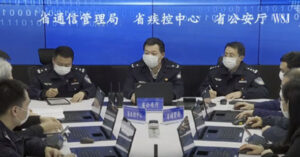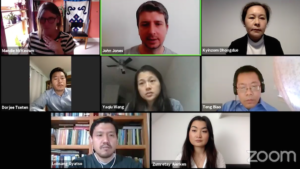 The International Tibet Network* (ITN) convened a panel of Tibetan and Uighur rights leaders, alongside Chinese-focused human rights experts, to speak in an online media briefing on World Health Day, April 7. This panel was coordinated to address the People’s Republic of China’s actions in the face of the initial coronavirus outbreak and its subsequent escalating repressive agenda in response to the spread of the virus.
The International Tibet Network* (ITN) convened a panel of Tibetan and Uighur rights leaders, alongside Chinese-focused human rights experts, to speak in an online media briefing on World Health Day, April 7. This panel was coordinated to address the People’s Republic of China’s actions in the face of the initial coronavirus outbreak and its subsequent escalating repressive agenda in response to the spread of the virus.
ITN reported that the panel met to discuss the repressive security and surveillance measures that have been put in place to prevent the spread of information and opinions that challenge China’s constructed narrative around the origination of the coronavirus, and its handling of what has unfolded into a global crisis. The domestic and international propaganda efforts being rolled out by China, including its rush to declare victory in its struggle against the coronavirus, was addressed, together with how this affects Tibetans and Uighurs, in particular, as extremely repressed people, as well as any Chinese citizen who is seen by the Chinese Communist Party to challenge their absolute control at this time.
Dr Teng Biao, a Chinese Human Rights Lawyer, opened the briefing, explaining how the first case of the virus could be traced back to November 17, 2019, saying this implied that Xi Jinping and top Chinese leaders already knew about the seriousness of the coronavirus in early January or even by late December, and decided to hide the information for its own political considerations. Dr Teng Biao stated, “In general we have to realise that the Chinese Government has escalated suppression online and social control. COVID-19 is being used by the Chinese Communist Party (CCP) as a chance to strengthen its totalitarianism and the CCP’s suppression of freedom.”

Uncovering China’s Coronavirus Agenda: Tibetans, Uyghurs, and Chinese activists speak up
Photo: screen grab
Kyinzom Dhongdue, Executive Director of the Australia Tibet Council* reminded the panel of the already existing repressive environment in Tibet, which, she said, has been this way for many years, stating that the lockdown the rest of the world now faces are the normal living conditions for Tibetans living in Chinese occupied Tibet. She continued, saying that earlier this year Tibet was rated as the second least free country in the world for the fifth time in a row and stated that she finds the current situation deeply troubling.
Zumretay Arkin, Programme and Advocacy Manager, World Uighur Congress*, voiced concerns over the lack of information known in regards to East Turkestan and in particular in the camps which hold between one and three million Uigyurs and other ethnic minorities, saying that the camps are breeding grounds for the spread of any virus.
Yaqiu Wang, a China researcher at Human Rights Watch*, spoke on censorship and propaganda, highlighting how the Chinese Government was demanding that people focus on sentimental stories of the great sacrifices being made across the country by its people, whilst the Chinese authorities are punishing, arresting and taking extreme measures to silence anyone who was seen to criticise the government.
Lobsang Gyatso, the Digital Security Programme Director at Tibet Action* Institute spoke of Chinese censorship and how this has led to the spread of COVID-19, in particular the censorship of online content. He continued, saying that it is worrying to see the rest of the world following suit and beginning to use similar apps to track citizens. He finished by saying
that we need to understand that the tech companies are not only responsible, but complicit in allowing these despotic measures to become the social norm in China.
Dorjee Tseten, Executive Director of Students for a Free Tibet* International, summarised this pandemic as a manmade catastrophe which could have been stopped if the Chinese Communist Regime had not been allowed to act as they have been acting for many years. His message is to work together to prevent Xi Jinping from changing the narrative of this pandemic to protect his own power, glory and authority.
- The International Tibet Network is a global coalition of Tibet-related non-government organisations, working to maximise the effectiveness of the worldwide Tibet movement.
- The Australia Tibet Council campaigns for the freedom and human rights of Tibetans, it is a not-for-profit organisation, funded by members across Australia.
- The World Uighur Congress is an international organisation of exiled Uighur groups that aspires to “represent the collective interest of the Uighur people” both inside and outside of East Turkestan – known as Xinjiang – in south eastern China where the ethnic minority Muslim Uighurs live under similar repression as that experienced by Tibetans in Tibet under Chinese rule.
- Human Rights Watch is an international non-government organisation, headquartered in New York, that conducts research and advocacy on human rights.
- The Tibet Action Institute combines the power of digital communication with strategic nonviolent action to advance the Tibetan freedom movement bringing together expert campaigners, strategists, and technologists to develop and implement strategies to equip Tibetans with the tools and knowledge to achieve human rights and freedom in Tibet.
- Students For a Free Tibet is a global grassroots network of students and activists working in solidarity with the Tibetan people for human rights and freedom.




 Print
Print Email
Email